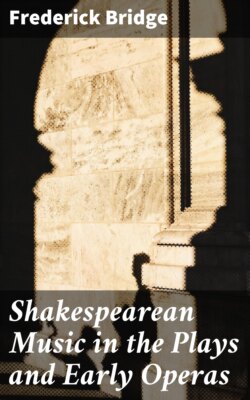Читать книгу Shakespearean Music in the Plays and Early Operas - Bridge Frederick - Страница 4
На сайте Литреса книга снята с продажи.
CHAPTER II
THE ACCOMPANIMENT OF THE SONGS. THE SINGERS
ОглавлениеTable of Contents
Before commenting upon the songs, it will be well to explain the way in which they were accompanied, and also consider the people who sang them.
The original accompaniments to the songs in the plays were not, of course, written for a pianoforte! the lute and the bass viol were the usual instruments, and it is the accompaniments written for them which I have as far as possible adopted.
The lute was a large instrument, plucked by the fingers and not played with a bow. It has long been obsolete and few people can now make much use of it. It was a difficult instrument to play and to keep in tune, and an old author says: “If a lutenist attains the age of eighty you may be sure he has spent sixty years of his life tuning his instrument, and I have been told that in Paris it cost as much to keep a lute in order as would keep a horse!”
Another old author gives this advice for preserving the instrument. “You shall do well, even when you lay it by in the day-time, to put it into a bed that is constantly used, between the rug and the blanket.” He adds that there is a danger of people sitting upon the bed and smashing the lute, and that he had lost two or three lutes in that way!
With regard to the singers. Although some of the actors may have sung, yet there are examples of singers being introduced who have nothing to do with the action of the 8 play. For instance, in As You Like It, the song “It was a Lover and his Lass” is sung by two pages apparently introduced for the purpose. In The Merchant of Venice the song “Tell me where is Fancy bred” is preceded by the stage direction, “Music, while Bassanio comments on the caskets to himself,” and the song has a “burden” (or chorus), “Ding, dong, bell,” which is directed to be sung by all. In the infancy of the Theatre companies of boy actors were very general. The boys of St. Paul’s and the Chapel Royal constantly acted before the Court and nobility. It seems probable that the theatrical establishments of royal and noble persons were in a way attached to their chapels, and in order to ensure a supply of good voices boys were actually pressed into the service, being taken by force even from other establishments. An account of such a case, written by a boy who attained some considerable distinction in after life—Thomas Tusser, author of the Five Hundred Points of Good Husbandry (born in the reign of Henry VIII.)—may be of interest. Tusser was a boy at Wallingford in Berkshire and taken by force, for his voice, by a pressgang. The poem is a preface to his book.
What robes! how bare! what colledge fare!
What bread how stale! What penny ale!
Then Wallingford how wert thou abhor’d
Of silly boies!
Thence for my voice I must (no choice)
Away of force like posting horse,
For sundry men had placards then
Such child to take:
The better brest,[2] the lesser rest,
To serve the queere,[3] now there, now here,
For time so spent, I may repent,
And sorrow make.
But marke the chance, myself to ’vance,
By friendship’s lot to Paule’s I got;
So found I grace a certain space
Still to remain
With Redford[4] there, the like no where
For cunning such and vertue much
By whom some part of musicke art
So did I gaine.
From Paule’s I went, to Eaton sent
To learn streightwaies the Latin phraies
Where fiftie stripes given to mee
At once I had
For fault but small or none at all,
It came to pass thus beat I was;
See, Udall,[5] see the mercie of thee
To me poore lad.
From London hence, to Cambridge thence
With thankes to thee, O Trinitie,
That to thy hall, so passing all,
I got at last.
It will be seen later on, in connection with the production of the early operas, that the boys and men of the Royal Chapel were constantly employed in the performances.
